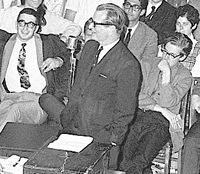Coming to U of T in 1966 as one undergraduate among thousands, I didn’t expect to have much to do with the president of the university, Claude Bissell. Our worlds seemed too far apart, and my first impression of him was from a distance.
Surprisingly, I first really met him while visiting Harvard – where he was the first Mackenzie King Professor of Canadian Studies from 1967 to 1968 – and he was gracious and direct. “You must be Saul’s son.” (He had graduated from University College in 1936, the same year as my father.) “He was so bright and so funny. Are you, too?” The conversation then turned to the wider world of politics and university protests, which were beginning to dominate the scene on every campus. I must have seemed not so bright and not so funny, but I was impressed by his willingness to engage in debate, and to listen.
The following year, 1968 to 1969, was in many ways very difficult for the president. He had wanted to reform university governance because he was troubled by the gap between the academic and business sides of the university, and I think he was tired of being caught in the middle. His return to U of T from Harvard that fall was to have marked the beginning of a gentle campaign to make some fundamental changes. What he found was that the students and faculty wanted to control the process. Claude Bissell and I ended up spending many long hours in each other’s company as members of the Commission on University Governance. It was here that a wary tangle across the generations became a friendship. He was not happy with the politicization of his project; indeed, he was troubled and depressed by it. But I came to understand the depth of his love for the university, his intimate knowledge of its every nook and cranny, and his deep political skill at managing it. I see him now as comparable to a master first minister temporarily reduced to leading a minority government. He would probably not have enjoyed being described as having great political skills, but he had them in abundance. And it did not take long for him to regain his majority.
He had a commanding physical presence, a great voice, and a love of debate and repartee. He took enormous joy in conversation and discussion of all kinds. He was irreverent, witty and eloquent. On public occasions, he always spoke carefully and with immense thought. He admired wit and possessed much of it himself; when introducing John Kenneth Galbraith at a public lecture, he combined the personal with the public in a completely compelling way. He understood that leaders had to inspire and, while an effective manager, he understood that leadership is far more than that. He took issue with the rhetoric of the student left, but he was not by any means a reactionary. He understood that an openness to reform was the best technique to keep other forces at bay.
As the years passed, I would see him in our new and different roles. I treasure the note he sent with a cheque for my first political campaign, and the kindness he showed me on my defeat in 1995. Age was not kind to him in the end, but he soldiered on with immense courage. He was president for 13 years, from 1958 to 1971, the years of the university’s greatest growth until the present time. Claude Bissell will certainly stand with the greatest of our presidents, Sir Robert Falconer and Sir Daniel Wilson. He was a man of vision, humour and uncommon decency. I am proud to have sparred with him, but prouder still to have become his friend.
Bob Rae (BA 1969 University College, LLB 1977, LLD Hon. 1999) is the former premier of Ontario.






No Responses to “ Claude Bissell (1916-2000) ”
During the early 1960s, when I worked in the Sigmund Samuel Library, a young Australian woman was hired in the periodicals department. One lunch hour while she was in charge of the desk, a fellow came to charge out a periodical. She asked to see his card. "What card am I supposed to have?" he asked. She explained that it would be a student or a faculty card. "I am Claude Bissell, the president," was his response. "Oh yeah, everybody could say that," she said. "Can you prove it?" Obviously he did, because he left the reading room with the desired periodical. Then he went straight to the chief librarian's office to put in a good word for the efficient young librarian. And at the library we all loved him for it.
Ottilia Koel
Hamden, Conn.